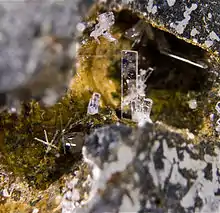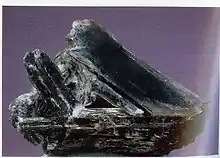| Paralaurionite | |
|---|---|
 Platey clear paralaurionite crystals from slag in the Thorikos area, Lavrion, Attica, Greece | |
| General | |
| Category | Halide mineral |
| Formula (repeating unit) | PbCl(OH) |
| IMA symbol | Plri[1] |
| Strunz classification | 3.DC.05 |
| Crystal system | Monoclinic |
| Crystal class | Prismatic (2/m) (same H-M symbol) |
| Space group | C2/m |
| Unit cell | a = 10.865(4) Å, b = 4.006(2) Å, c = 7.233(3) Å; β = 117.24(4)°; Z = 4 |
| Identification | |
| Color | Colorless, white, pale greenish, yellowish, yellow-orange, rarely violet |
| Crystal habit | Elongated tabular crystals |
| Twinning | Contact twinning on {100} |
| Cleavage | Perfect on {001} |
| Tenacity | Flexible, non-elastic |
| Mohs scale hardness | 3 |
| Luster | Subadamantine |
| Diaphaneity | Transparent to translucent |
| Specific gravity | 6.05–6.15 |
| Optical properties | Biaxial (-) |
| Refractive index | nα = 2.050 nβ = 2.150 nγ = 2.200 |
| Birefringence | δ = 0.150 |
| Pleochroism | Visible |
| References | [2][3][4][5] |
Paralaurionite is a colorless mineral consisting of a basic lead chloride PbCl(OH) that is dimorphous with laurionite. It is a member of the matlockite group.[6] The name is derived from para-, the Greek for "near", and laurionite, because of its polymorphic relationship to it.[4] Bright, yellow tips of thorikosite can form on paralaurionite crystals and paralaurionite may also be intergrown with mendipite.[7][8]
Occurrence
It was first described in 1899 for an occurrence in slag in Laurium, Attica, Greece.[3] In 1952 an occurrences of it was reported from the Mammoth Mine, Arizona.[9]
It occurs in lead bearing slag which has been exposed to seawater. It also occurs in polymetallic ore deposits. It occurs associated with laurionite, penfieldite, fiedlerite, phosgenite in slag deposits; and with leadhillite, matlockite, cerussite, hydrocerussite, diaboleite and wherryite in the Mammoth mine location.[3]
References
- ↑ Warr, L.N. (2021). "IMA–CNMNC approved mineral symbols". Mineralogical Magazine. 85 (3): 291–320. Bibcode:2021MinM...85..291W. doi:10.1180/mgm.2021.43. S2CID 235729616.
- ↑ Mineralienatlas
- 1 2 3 Handbook of Mineralogy
- 1 2 Paralaurionite on Mindat.org
- ↑ Paralaurionite on Webmineral
- ↑ Mineralogical magazine. Mineralogical Society, HighWire Press. 1 January 2006. pp. 643–8. Retrieved 26 January 2012.
- ↑ The Mineralogical record. 1986. pp. 185–88. Retrieved 26 January 2012.
- ↑ Williams, Peter A. (August 1990). Oxide zone geochemistry. E. Horwood. pp. 262–4. ISBN 978-0-13-647553-8. Retrieved 26 January 2012.
- ↑ Mineralogical Society (Great Britain) (1952). The Mineralogical magazine and journal of the Mineralogical Society. Mineralogical Society. pp. 341–2. Retrieved 26 January 2012.
